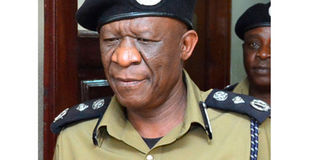Reforming police key to serving all better

The new Inspector General of Police (IGP), Mr John Martins Okoth-Ochola. FILE PHOTO
What you need to know:
- The issue: Police reforms
- Our view: The new police leadership must abhor politicisation and militarisation.
A more radical option is re-evaluating all police personnel afresh.
The new Inspector General of Police (IGP), Mr John Martins Okoth-Ochola, has hit the ground running. He on Monday shook up the top brass of police and in the process, upturned the last high-level transfers that his predecessor made.
By recalling Federal Bureau of Investigations (FBI)-trained Abasi Byakagaba from superintending Oil and Gas to head Counter-Terrorism and deploying long-sidelined senior officers such as commissioners of police Lawrence Niwabine and Basil Mugisha to key command positions, the IGP’s intent is manifest: Prioritising experience, seniority and professionalism in police operations.
A day earlier, he had made wide-impact changes in which he merged the Oil and Gas and Counter-Terrorism directorates and centralised command of six semi-autonomous units. These changes were made public only yesterday. Subsequently, the supervision of the Flying Squad, Special Investigations Unit and the Criminal Case File Tracking Task force revert to the Criminal Investigations Directorate. The Directorate of Forensic Services will superintend Cybercrime Unit while the Surveillance and Special Operations move under Crime Intelligence Directorate.
We sturdily welcome this administrative re-organisation. First, it eliminates duplication of work and wastage. Second, streamlined operations promote efficiency, better coordination and accountability. Third, the balkanisation of Uganda Police Force had injected artificial competition and self-serving power wrangles and careered the Force off its cardinal mandate of protecting life and property. And fourth, veterans will use their honed skills for stable leadership and professionalisation besides hem-in newcomers whose accelerated promotion smothered operations.
We argue that this in-house cleaning, attractive as it is, however means nothing unless the escalating crime is tackled and Ugandans of all background begin to feel safe again. That is the essential deliverable that all citizens expect from the yet unblemished leadership of the new IGP and his deputy Brig Sabiiti Muzeyi. And there’s evidently a public goodwill to support their work if they mean well for Ugandans and leave politics to keep or remove President Museveni from power.
The Opposition accused former IGP Kale Kayihura, and pilloried him for, militarising and politicising police. He tied and measured his success and that of the rank-and-file not necessarily by guaranteeing human security, but ensuring and enforcing regime survival.
His administration stopped releasing annual crime reports and kept citizens in the dark. Rampant burglaries, kidnap offences, fatal attacks on and gun grabs from on-duty policemen invalidated official claims of decreasing criminality. The new police leadership must abhor politicisation and militarisation.
A more radical option is re-evaluating all police personnel afresh for their jobs.




